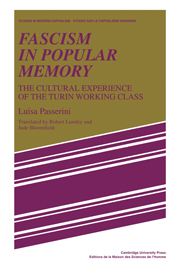Book contents
- Frontmatter
- Contents
- Preface
- Introduction
- I ORAL SOURCES AND THE ANALYSIS OF CULTURAL IDENTITIES
- II ORAL SOURCES AND THE HISTORY OF GRASS-ROOTS CULTURAL FORMS
- III ORAL SOURCES AND THE HISTORY OF THE EVENTS OF EVERYDAY LIFE
- 3 Forms of social acceptance of Fascism
- 4 Resistance to demographic policy
- 5 Mussolini's visit to Mirafiori
- Appendix
- Notes
- Index
3 - Forms of social acceptance of Fascism
Published online by Cambridge University Press: 04 August 2010
- Frontmatter
- Contents
- Preface
- Introduction
- I ORAL SOURCES AND THE ANALYSIS OF CULTURAL IDENTITIES
- II ORAL SOURCES AND THE HISTORY OF GRASS-ROOTS CULTURAL FORMS
- III ORAL SOURCES AND THE HISTORY OF THE EVENTS OF EVERYDAY LIFE
- 3 Forms of social acceptance of Fascism
- 4 Resistance to demographic policy
- 5 Mussolini's visit to Mirafiori
- Appendix
- Notes
- Index
Summary
The values of order
In the previous chapter, oral testimonies were considered from the point of view of cultural resistance and the history of culture. However, the focus will now be on the problem of analysing the changing relations between dominators and dominated. Oral sources are invaluable in opening up this area for further research and for exploring the history of ‘mentalities’ and patterns of thought.
In the testimonies, the elements indicating acceptance of Fascism often appear tagged on to declarations expressing dissociation or distance from the regime. Nevertheless, we find important signs of acceptance within the orbit of the prevailing anti-fascist ideology. In the first place, the very idea of order and imposed uniformity was accepted as a positive value. The imposition of uniformity is recalled in its material and physical aspects, and presented as the satisfaction of a desire for public identity, especially among the younger ones.
elena (1919) A boy in my building was Fascist, we all were! Then when I managed to put the – that's when they lent it to me, my father never bought one because we were so poor, but if I had the uniform of giovane italiana … I was the happiest girl in the world! Well, so that's how you were then.
I remember when the Duce came to Turin, for example, my house was in corso Unione Sovietica, he passed right in front, then they'd given us in the factories permission to go out, to go and see him … hey, what an honour! […]
- Type
- Chapter
- Information
- Fascism in Popular MemoryThe Cultural Experience of the Turin Working Class, pp. 129 - 149Publisher: Cambridge University PressPrint publication year: 1987



